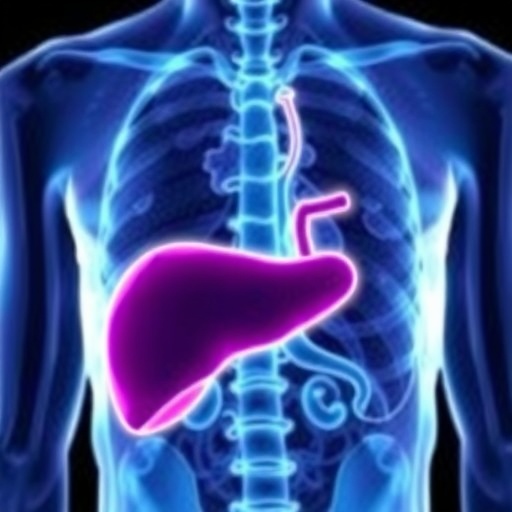In the relentless pursuit of more effective treatments for advanced hepatocellular carcinoma (HCC), a groundbreaking meta-analysis recently published has cast new light on an emerging multimodal approach. Researchers have rigorously evaluated the combination of stereotactic body radiation therapy (SBRT) with targeted agents and immunotherapies, revealing significant survival benefits without exacerbating treatment-related toxicities. This comprehensive investigation, comprising data from over 20,000 patients, offers fresh hope in a field long marked by limited therapeutic progress.
Hepatocellular carcinoma, the predominant form of primary liver cancer, remains a formidable clinical challenge, particularly in its advanced stages where prognosis is grim. Traditional systemic therapies often provide only modest improvements, and the need for refined therapeutic strategies has been increasingly pressing. It is within this context that SBRT, a technology enabling highly precise and concentrated radiation delivery, has garnered interest alongside the rising success of molecularly targeted drugs and immunomodulatory treatments.
The meta-analysis synthesizes findings from nine distinct studies encompassing a patient cohort exceeding 20,800 individuals. Detailed analyses explored both efficacy endpoints—including overall survival (OS) and progression-free survival (PFS)—and safety outcomes, focusing on adverse events (AEs) of varying severity. These data sets provide robust statistical power facilitating a nuanced understanding of how combining SBRT with pharmacological interventions alters patient trajectories.
Notably, the combination strategy demonstrated a remarkable 55% improvement in one-year overall survival rates when compared with targeted agents or immunotherapies alone. This enhancement extended to two-year survival as well, where patients experienced a 63% greater chance of prolonged survival. These findings suggest that localized control of tumor burden via SBRT synergizes with systemic agents, mounting a dual-front attack on the malignancy.
Beyond overall survival, objective response rates also improved substantially. The pooled risk ratio of 1.87 indicates nearly double the likelihood of tumor shrinkage or stabilization in patients receiving the combined regimen. This enhanced tumor response inherently translates into tangible clinical benefits, potentially delaying disease progression and improving patients’ quality of life.
The mortality risk analysis, quantified by hazard ratios, further underscored the protective effect of the combined approach. Patients treated with SBRT alongside pharmacotherapy saw their risk of death reduced by approximately 46%, while their likelihood of disease progression dropped by 51%. Such statistics underscore a profound impact on the natural course of advanced HCC.
Importantly, the amplified efficacy did not come at the cost of increased toxicity. The incidence of overall adverse events remained stable, with risk ratios near unity, signifying no statistically meaningful escalation in side effects. Even severe toxicities, categorized as grade 3 or higher, did not show a significant uptick, supporting the safety of integrating SBRT into systemic treatment frameworks.
These findings herald a potential paradigm shift in managing advanced HCC. The precise ablative capacity of SBRT may mitigate tumor burden efficiently, while targeted agents and immune checkpoint inhibitors engage molecular pathways and immune mechanisms to curtail cancer growth and dissemination. Their convergence could represent an optimized treatment axis, balancing potency with tolerability.
Professional oncologists and radiation specialists might find these results particularly compelling, as they suggest incorporating SBRT could elevate the standard of care. Previously, radiation therapy in HCC was often constrained by concerns over hepatic toxicity and limited efficacy, but technological advancements underpinning SBRT have forged new ground.
The meta-analysis methodology entailed rigorous selection and integration of heterogeneous studies differing in design and patient demographics, lending credibility and generalizability to the conclusions. Both fixed and random-effects models were employed to account for inter-study variance, ensuring robust and replicable observations.
This research is timely considering the expanding arsenal of targeted agents and immune therapies approved for HCC treatment. The ability to safely combine these systemic options with localized radiation could empower clinicians to tailor treatment plans more precisely, adapting to patient characteristics and disease burden.
Furthermore, investigations into mechanisms underlying synergy between SBRT and pharmacological agents are warranted. Hypothesized biological interactions include enhanced antigen presentation and immune activation triggered by radiation-induced tumor cell death, potentially augmenting immunotherapy efficacy.
The trial registration and adherence to systematic review protocols bolster the transparency and reproducibility of this study. Researchers globally can build upon these insights, refining protocols and exploring optimal sequencing or combinations to further improve patient outcomes.
In summary, the emerging evidence positions SBRT plus targeted and immunotherapeutic agents as a promising, safe, and effective combinatorial approach for advanced HCC. This integrated strategy could redefine treatment paradigms, offering improved survival and tumor control without added toxicity burdens.
As cancer therapeutics increasingly embrace precision and multimodal tactics, these results exemplify the potential of harnessing complementary modalities. This meta-analysis inspires optimism that future innovations will continue to translate into meaningful clinical advantages for patients battling hepatocellular carcinoma.
Subject of Research: Hepatocellular carcinoma treatment efficacy and safety
Article Title: Efficacy and safety of stereotactic body radiation therapy combined with targeted agents and immunotherapies in hepatocellular carcinoma: a systematic review and meta-analysis
Article References:
Hou, S., Hu, S., Wu, Q. et al. Efficacy and safety of stereotactic body radiation therapy combined with targeted agents and immunotherapies in hepatocellular carcinoma: a systematic review and meta-analysis. BMC Cancer 25, 1602 (2025). https://doi.org/10.1186/s12885-025-15061-4
Image Credits: Scienmag.com
DOI: https://doi.org/10.1186/s12885-025-15061-4




